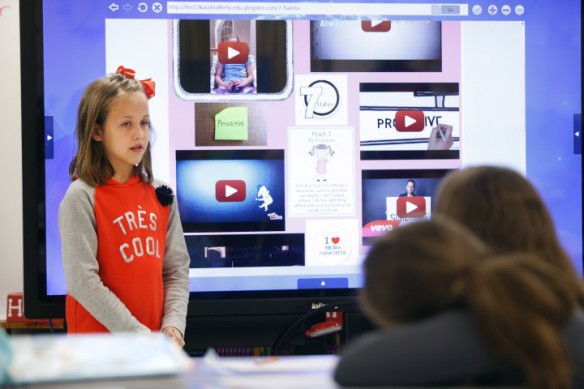
Third-grader Karah Lafferty gives a presentation about being proactive, one of The Seven Habits of Happy Kids, in Lisa Salyer’s class at Highland Elementary School (Johnson County).
Photo by Amy Wallot, Oct. 21, 2014
By Peter Mathews
peter.mathews@education.ky.gov
Eastern Kentucky schoolchildren have recently traveled to a copper mine, visited a White House chef, chatted with a Yellowstone Park ranger and taken a field trip to the Knoxville, Tenn., zoo, all without leaving their desks.
Those trips were made possible by a $30 million, four-year federal grant that is boosting technology, partnerships and regional collaboration in the 17 school districts that make up the Appalachian Renaissance Initiative (ARI), members say.
The districts are part of the Kentucky Valley Educational Cooperative (KVEC), which was one of five recipients nationally of Race to the Top funds in 2013.
KVEC fell short in its first attempt in 2012. “We were too stubborn and too committed not to continue,” said Jeff Hawkins, its executive director.
All 99 ARI schools have received new technology to create Next Generation Classrooms, using emerging tools such as Chromebooks, MacBook Airs and InFocus MondoPads –70-inch touchscreen monitors that offer remote connectivity and videoconferencing and serve as interactive whiteboards. The technology purchased through the grant is in ARI’s name, but the districts will own it when the grant period ends.
ARI resources have enabled districts to hire Innovation Coordinators who focus on driving innovation in personalized learning, educator effectiveness, college and career success, instructional technology and school readiness.
“The ARI grant is providing districts with technology capable of instructional tasks that could not be accomplished otherwise,” said Johnny Belcher, a project consultant. “For example, conferencing with field specialists from anywhere in the world and the ability to use wireless tablets and laptops for the purpose of interactive feedback and real-time monitoring of learning moves us toward a personalized approach.”
In October, ARI members gathered in Pikeville for a demonstration of how things are going. At the first Promising Practices Summit, teachers who had received $1,000 Learning Innovation grants gave brief presentations on 92 projects on which they are working. Members of ARI’s Student Senate held meetings. District teams who have been participating as members of the University of Kentucky’s Next Gen Leadership Academy described their plans to foster personalized learning through project-based inquiry and the new technology, and how they plan to implement standards-based grading and reporting.
One of the presenters at the summit was Lisa Salyer, who teaches at Highland Elementary in Johnson County. Salyer bought an iPad Mini with grant money and used an iTunes U app to develop lessons based on each of the “7 Habits of Happy Kids” for The Leader in Me program, which her school is implementing this year. She also bought books that teach the seven habits.
Salyer’s 3rd-graders create glogs – sophisticated digital posters that include a variety of media. She said access to the technology at home isn’t a problem for her students, and they take to it in the classroom easily.
“They are so used to video games and learning to play, the first thing they do is start exploring it, they don’t read the manual,” Salyer said. “They’ll know more about it in a week and show me things I didn’t know. When you listen to them talk, when you see them explaining on video, that’s when I understand that they know so much more than they can show me with paper and pencil.”
One critical element of ARI gives the region a new worldwide reach: an interactive learning portal called, in a nod to local culture, The Holler. The site was planned independently prior to the ARI award but was quickly integrated into the overall implementation design, said Bruce Parsons, developer of The Holler.
The rapidly expanding site contains:
- A social network, where users can make friends and post text and videos. Within it are user groups, also called Hollers, on such subjects as STEM Education, Best Practices and the Professional Growth and Effectiveness System (PGES). There are 26 so far. A data repository is just getting off the ground as well.
- A learning management area that eventually will enable users to create or take courses, whether they’re in Belfry or Belgium.
Parsons is director of new media at the University of Pikeville, an ARI partner. He said he thinks it’s the only social learning network ever designed for a specific region.
Hawkins said ARI’s aim is to create “an authentic regional culture of cross-district collaboration focused on improving teaching and learning.” To improve the quality of life in the region, it’s critical that school districts solidify partnerships with higher education, community organizations, government and others, he said.
The Holler puts it more bluntly: “We need to encourage people and groups within the community to create their own work and projects with cutting-edge technology, and not wait until someone tells them it’s okay to do so. We need disruptive and lasting change in the region that comes from an ownership of and increased access to technology. We don’t need permission, we need opportunity, and that is what The Holler will strive to create.”
Among other things, ARI officials will use college- and career-readiness levels, graduation rates, educator and student attendance rates and K-Prep and ACT scores to measure success. KVEC has contracted with the RAND Corporation to help with data evaluation.
“It’s not about just getting the money and doing this work,” Hawkins said. “It’s about delivering on the promise that I think we made as a region when we submitted the application. We are going to continue to accelerate our ability to teach effectively, lead effectively and learn effectively and do that in a setting that has a deep understanding that education is intimately connected to economic development.”
MORE INFO …
Jeff Hawkins jeff.hawkins@hazard.kyschools.us
Johnny Belcher johnny.belcher@pikeville.kyschools.us
Lisa Salyer lisa.salyer@johnson.kyschools.us
Bruce Parsons parsons@theholler.org




Leave A Comment